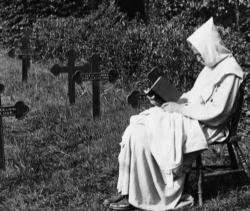To receive the joy of Christmas, we must deny ourselves courageously, which enables us to bow low humbly to receive the Infant King from the manger of the cattle stall to the manger of our hearts. If our hearts are clean of any sin that would block His royal entry into the deepest secret of our heart, we will be all the more ready to receive our Lord this Christmas with the greatest of joy.
During the liturgical season of Advent, we are challenged to prepare worthily for Christmas as we await with joyful patience the coming of our Lord Jesus. The days of Advent thus embrace a certain penitential spirit, as we are reminded of a world obscured by darkness before the birth of the Christ Child. The Rule of Saint Benedict, for all of its liturgical richness, seems at first to be curiously silent concerning Advent and even Christmas. However, upon deeper examination of the theme of rejoicing (from the Latin gaudeo, gaudere “to rejoice”), we come to understand how authentic joy arises in a heart that first has suffered:
“His heart quietly embraces suffering and endures it without weakening or seeking escape. For Scripture has it: Anyone who perseveres to the end will be saved (Mt 10.22), and again, Be brave of heart and rely on the Lord (Ps 27.14) … They are so confident in their expectation of reward from God that they continue joyfully and say, But in all this we overcome because of him who so greatly loved us (Rom 8.37)” ( Rule of Saint Benedict 7.35-39, on the fourth degree of humility).
During Advent, our world waits, and the longer night hours overshadow us … but they have a purpose for the Christian faithful in helping us to await with eager and hope-filled expectation the coming of our Lord Jesus born anew at Christmas. Such waiting involves a patience that at its very root implies a certain suffering, but it is not without spiritual purpose or benefit as trials of patience increase our hope if we are brave enough to enter into them. Patiens comes from the Latin verb patior, pati meaning “to suffer” and is the first element in Saint Paul’s great listing of the characteristics of love (cf. 1 Cor 13.4). Authentic love embraces a kind of long-suffering that endures over great lengths of time, and in that endurance, such suffering fortifies the one who is patient with an ever deeper love filled with hope. It is not a suffering without end as it leads ultimately to a great goal, the expectation of reward from God for hard labor and steadfast faithfulness in God. Such perseverance makes a fuller spirit of joy even possible, as the Christian realizes how God’s power has given him the brave courage to overcome the challenge at hand. Perseverance is full of hope-filled joy, knowing in loving faith that God will provide. In faith, we see that He always has done so before, in trust we see that He sustains us now in our present suffering, and we come to hope that He always will do so in the future … even though current circumstances may tempt to despair (from the Latin, de| spes, “away from hope”).
 A world in darkness suffers profoundly without the Light of Christ. However, the darker candles of our Advent wreaths have been pierced this week by the coming light of Christ in this time of Gaudete (Latin, “rejoice”), and the rose candle has been lighted to signify the great hope that “the Lord is near to all who call upon him, who call upon him in truth” (Ps 145.18). In lighting the violet candle on the Fourth Sunday of Advent, by no means have we returned to a darkness absent of hope! Indeed, the rose candle remains aflame in eager, hope-filled, joyful expectation of the coming fullness of light to arrive upon the Nativity of our Lord, signified by the lighting of the white Christmas candle soon to be lighted at center.
A world in darkness suffers profoundly without the Light of Christ. However, the darker candles of our Advent wreaths have been pierced this week by the coming light of Christ in this time of Gaudete (Latin, “rejoice”), and the rose candle has been lighted to signify the great hope that “the Lord is near to all who call upon him, who call upon him in truth” (Ps 145.18). In lighting the violet candle on the Fourth Sunday of Advent, by no means have we returned to a darkness absent of hope! Indeed, the rose candle remains aflame in eager, hope-filled, joyful expectation of the coming fullness of light to arrive upon the Nativity of our Lord, signified by the lighting of the white Christmas candle soon to be lighted at center.
In the Rule of Saint Benedict, the reference to joy is curiously infrequent, but one reference that is teachable to the present theme connects joy to the penitential spirit of Lent in one who awaits the joys of Easter. Saint Benedict writes on the observance of Lent:
“We urge the entire community during these days of Lent to keep its manner of life most pure … refusing to indulge evil habits and by devoting ourselves to prayer with tears, to reading, to compunction of heart and self-denial … so that each of us will have something above the assigned measure to offer God of his own will with the joy of the Holy Spirit (1 Thes. 1.6) … look[ing] forward to holy Easter with joy [gaudio] and spiritual longing” (RB 49).
Saint Benedict clearly understands here that for joy to be experienced in its fullness, suffering first precedes. Indeed, what makes prayer with tears, compunction of heart, and denial of self even possible is the hope that comes from embracing the joy of the Holy Spirit. We surely need the supernatural help of God’s grace to be capable of growing in holiness through the trials of suffering, however Easter is near every Lent and promises to bring the superabundant joy for which Lent longs. The suffering found in the longing of Lent precedes the joy experienced at Easter, and such Easter joy will be diminished in one who truly has not embraced first the disciplined penitential spirit of Lent.
 In the same way, the Christian who jumps immediately to celebrating Christmas without adequate spiritual preparation — embracing a certain suffering that comes from longing during Advent for the more profound presence of Jesus in his life — will shortchange himself of the even greater joy that could have been at Christmas. As Christmas quickly draws near, may we use these days genuinely to ready ourselves for the coming of our Infant King ever more deeply in our lives. In these last days of Advent, we have a prime opportunity to be brave in readying our heart as a worthy home for the Christ Child by celebrating the Sacrament of Reconciliation, casting away all obstacles to the Lord’s Coming fully to us. To receive the joy of Christmas, we must deny ourselves courageously, which enables us to bow low humbly to receive the Infant King from the manger of the cattle stall to the manger of our hearts. If our hearts are clean of any sin that would block His royal entry into the deepest secret of our heart, we will be all the more ready to receive our Lord this Christmas with the greatest of joy.
In the same way, the Christian who jumps immediately to celebrating Christmas without adequate spiritual preparation — embracing a certain suffering that comes from longing during Advent for the more profound presence of Jesus in his life — will shortchange himself of the even greater joy that could have been at Christmas. As Christmas quickly draws near, may we use these days genuinely to ready ourselves for the coming of our Infant King ever more deeply in our lives. In these last days of Advent, we have a prime opportunity to be brave in readying our heart as a worthy home for the Christ Child by celebrating the Sacrament of Reconciliation, casting away all obstacles to the Lord’s Coming fully to us. To receive the joy of Christmas, we must deny ourselves courageously, which enables us to bow low humbly to receive the Infant King from the manger of the cattle stall to the manger of our hearts. If our hearts are clean of any sin that would block His royal entry into the deepest secret of our heart, we will be all the more ready to receive our Lord this Christmas with the greatest of joy.


